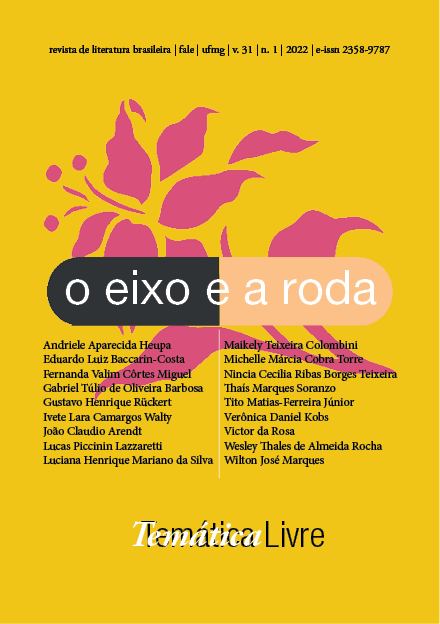Iracema (1865 to 1981)
Literature, Cinema, and Formation of Brazilian Identity
DOI:
https://doi.org/10.17851/2358-9787.31.1.187-207Keywords:
Iracema, romanticism, colonization, filmic adaptation, braziliannessAbstract
This article, using comparative methodology, aims to review the novel Iracema (1865), by José de Alencar, in order to relate it to the film Iracema: uma transa amazônica (1981), directed by Jorge Bodanzky and Orlando Senna. The theoretical framework includes the postulates by Antonio Candido, Zilá Bernd, Wayne Booth, Marcel Martin, among others. Due to the fact that the analyzed works correspond to different media and historical contexts, this study proposes comparisons about intermediality and 19th and 20th centuries’ socio-historical aspects. Based on these oppositions, it is possible to observe that, despite the media differences, the film’s plot reflects 1970s political issues, mainly the Imperialism, in order to deepen some themes that romanticism prose already used, such as, for example, the antagonism between self and foreigner. With these results, the conclusion is that, with regard to the colonization process, the film offers a new interpretive approach, because it obeys modernist ideals. Thus, this paper covers two moments in Brazilian History and Literature, focusing on essential idiosyncrasies in the formation of national identity.
Downloads
References
ALENCAR, J. de. Iracema. São Paulo: Livraria Martins, 1941.
ANCHIETA, J. de. Cartas, Informações, fragmentos históricos e Sermões. Rio de Janeiro: Civilização Brasileira, 1933. Disponível em: . Acesso em: 20 jul. 2021.
AUMONT, J. A imagem. São Paulo: Papirus, 2002.
BERND, Z. Literatura e identidade nacional. Porto Alegre: UFRGS, 1992.
BOOTH, W. Distance and point of view: an essay in classification. In: HOFFMAN, M. J; MURPHY, P. D. (Eds.). Essentials of the theory of fiction. Durham; London: Duke University Press, 2005. p. 83-100.
BOSI, A. Dialética da colonização. São Paulo: Companhia das Letras, 1992.
BRENKMAN, J. On voice. In: HOFFMAN, M. J; MURPHY, P. D. (Eds.). Essentials of the theory of fiction. Durham; London: Duke University Press, 2005. p. 411-442.
BRUZZO, C. Iracema... de Bodanzky e Senna: uma ficção pouco comportada. Educação e Sociedade, Campinas, v. 27, n. 94, p. 295-299, jan.-abr. 2006. Disponível em: . Acesso em: 20 jul. 2021.
CANDIDO, A. Literatura e sociedade. São Paulo: T. A. Queiroz, 2000.
CANDIDO, A. O romantismo no Brasil. São Paulo: Humanitas; FFLCH/SP, 2004.
CANDIDO, A. et al. A personagem de ficção. São Paulo: Perspectiva, 2007.
COIMBRA, M. da S.; COUTINHO, E. de F. Do livro ao filme: uma trajetória de Iracema. Ipotesi, Juiz de Fora, v. 13, n. 1, p. 89-101, jan.-jul. 2009. Disponível em: . Acesso em: 20 jul. 2021.
IRACEMA: uma transa amazônica. Direção de Jorge Bodanzky e Orlando Senna. Brasil: Orlando Senna e Wolfgang Gauer; Embrafilme, 1981. 1 DVD (90 min); son.
MARTIN, M. A linguagem cinematográfica. Lisboa: Dinalivro, 2005.
MEMMI, A. Retrato do colonizado precedido de retrato do colonizador. Rio de Janeiro: Civilização Brasileira, 2007.
OLIVEIRA, A. M. F. de. Os filhos de Marte na América — “Iracema” e “Martín Fierro” enquanto romances-símbolos de seus países. In: ANTELO, R. (Org.). Identidade & representação. Florianópolis: UFSC, 1994. p. 323-332.
PRADO, P. Retrato do Brasil. Ensaio sobre a tristeza brasileira. São Paulo: Companhia das Letras, 1999.
PUNTONI, P. Tupi ou não tupi? Uma contribuição ao estudo da etnohistória dos povos indígenas no Brasil colônia. Ethnos, Recife, ano 2, n. 2, p. 5-19, 1998. Disponível em:
. Acesso em: 17 jul. 2021.
STAM, R. Teoria e prática da adaptação: da fidelidade à intertextualidade. Ilha do desterro, Florianópolis, n. 51, p. 19-53, jul./dez. 2006.
XAVIER, I. Iracema: o cinema-verdade vai ao teatro. Devires, Belo Horizonte, v.2, n.1, p. 70-85, jan.-dez. 2004.




 Esta obra está licenciada com uma Licença
Esta obra está licenciada com uma Licença 